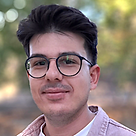Lab members

Dafne Campigli Di Giammartino
Principal Investigator PI
My research has mostly focused on understanding the cellular mechanisms underlying principles of gene expression and cell identity, aiming to shed light on the basic principles that govern these processes, both in physiological and pathological conditions.
My expertise is multidisciplinary, ranging from RNA biology to chromatin 3D architecture, stem cells and cancer.
After more than two decades abroad ( at Columbia University and Weill Cornell Medical College in New York) I have established in 2023 my research group at the Italian Institute of Technology!

Stefania Policicchio
Post-Doctoral fellow
Since November 2022
I am an early career researcher with a solid background in regulatory genomics and epigenetics and expertise in both wet-lab (e.g. flow cytometry, long-read sequencing technologies) and computational methods (omics data analysis).After completing an MSc in Neurobiology at University of Pavia, in 2015 I have moved to the UK to undertake a 10-month funded internship at King’s College London (KCL) where I have been trained in Statistical Genetics and omics data analysis. In 2016 I joined the Complex Disease Epigenomics Group in Exeter where I have completed my PhD and worked as post-doctoral researcher. My research focused on understanding the causes and consequences of molecular variation in the human brain, and its relevance to neuropsychiatric phenotypes. In particular, I explored how epigenomic variation influences gene regulation in the human brain, profiling DNA and histone modifications across specific brain regions and cell-types and relating these to neuropsychiatric and neurodegenerative disease such as suicidal behaviour, schizophrenia and dementia.After 7 years abroad, I have returned to my home country, Italy, and I am looking forward to join Dr. Di Giammartino’s team at the Italian Institute of Technology (IIT) to investigate the role of ncRNAs and their epitranscriptional modifications in the organization of the 3D genome.

Julien Ouvrard
Post-Doctoral fellow
Since December 2023
I am a young French wet-lab researcher specializing in Epigenetics and ncRNA Biology. Since my early studies I have developed a strong foundation in genomics, as well as molecular and cellular biology I obtained my Msc in molecular and cellular biology in 2018 at the University of Poitiers. During my early years in university, I became increasingly fascinated by the field of long non-coding RNA biology.
This led me to pursue a PhD at the University of Toulouse, which I completed in 2023 on the roles of very long intergenic non-coding RNAs in the 3D chromatin reorganization in senescence. This PhD research gave me the opportunity to discover the fascinating world of spatial genome and nuclear architecture. It became clear to me that I wanted to continue investigating the underlying biological functions and mechanisms of long non-coding RNAs in relation to 3D chromatin reorganization and nuclear architecture, particularly in the context of physiological and malignant cell fate determination. In line with this research direction, I recently joined Dr. Di Giammartino's team at the Istituto Italiano di Tecnologia in Genova in December 2023, whose interests fit perfectly with mine and where I will be focused on the role of lncRNAs epitranscriptomics in the 3D chromatin hubs network of glioblastoma cancer stem cells

Ioannis Saitoglou
PhD Student
Since October 2024
I am a young researcher from Greece, holding a Master’s degree in Translational Research in Biomedicine from Democritus University of Thrace that I obtained in July 2024. I completed both my Bachelor’s and Master’s studies at the Department of Molecular Biology and Genetics in Alexandroupolis, Greece. During my Master’s studies, my research focused on breast cancer, specifically exploring the developmental processes of the mammary gland using mouse models. This experience sparked my interest in understanding molecular mechanisms. Driven by a desire to expand my expertise in molecular biology and delve deeper into cancer research, I applied to the PhD program at the European School of Molecular Medicine (SEMM). In October 2024, I was accepted into the program and began my PhD in November 2024 at the Istituto Italiano di Tecnologia (IIT) in Genoa, Italy. My project is a collaboration between Dr. Di Giammartino’s Lab and Dr. Vicidomini’s Lab, offering an interdisciplinary approach that combines molecular biology and advanced microscopy. My PhD research focuses on the epitranscriptomic roles of long non-coding RNAs (lncRNAs) within 3D chromatin hubs and transcriptional condensates, investigating their spatial localization through state-of-the-art microscopy and their molecular interactions with RNA-binding proteins. This project represents an exciting challenge and an opportunity for me to broaden my scientific knowledge while contributing to an emerging field of research. I am deeply grateful for this opportunity and eager to embark on this new chapter in my academic journey.

Anja Tolic
Post-Doctoral fellow
Since December 2024
I am a researcher with experience in both wet-lab and computational biology. I hold MSc and PhD degrees in molecular biology from the University of Belgrade, Serbia, where I focused on epigenetics. My doctoral research explored the interplay between TET and PARP proteins and their impact on DNA (de)methylation. Additionally, I contributed to projects that implemented CRISPR-based tools for targeted DNA methylation in the contexts of diabetes and cancer research.
Over the years I developed a strong interest in bioinformatics, leading me to pursue an unconventional career path and earn a MSc in Applied Bioinformatics from Cranfield University, UK, in 2024. Joining the Italian Institute of Technology (IIT) and the teams of Dr. Di Giammartino and Dr. Farabella has allowed me to integrate my expertise in epigenetics with computational approaches, in order to contribute to research on RNA biology and 3D chromatin structure.

Morgana Dalla Palma
Previous PhD Student
I'm a paragraph. Click here to add your own text and edit me. It's easy.
